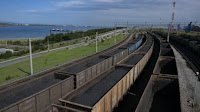Iran's acting Foreign Minister, Ali Baqeri Kani, emphasized
the importance of multilateralism and constructive interaction among
independent bodies within the Asia Cooperation Dialogue (ACD) member states.
In a message on his social media X account, Baqeri Kani
pointed out that the recent ACD meeting in Tehran provided an opportunity for
the representatives of the member states and the secretaries general of the
Asian international organizations to discuss and exchange opinions on the
issues of the agenda of the meeting and the perspective of the activities of
the forum.
Also speaking on Monday, and during a meeting with D-8
Secretary General Isiaka Abdulqadir Imam on the sidelines of the ACD summit,
Baqeri Kani called for the organization to take an active and innovative role
in various economic and commercial sectors to benefit its members.
Baqeri Kani urged the D-8 to enhance dynamism and promote
synergy among its member states to achieve the organization's goals and implement
its plans effectively.
He praised the recent D-8 foreign ministers' meeting in
Istanbul, which focused on the Zionist regime's crimes against the Palestinian
people in Gaza, showcasing the D-8's determination and capacity to address
significant issues in the Muslim world and beyond.
Isiaka Abdulqadir Imam, the D-8 Secretary General,
acknowledged Iran's active role in both the D-8 and the Asia Cooperation
Dialogue (ACD). He expressed optimism that the ongoing ACD meeting in Tehran
would yield positive outcomes for its member states. Imam elaborated on the
D-8's agenda, particularly in the economic and financial sectors, and welcomed
Iran's readiness for close cooperation with the organization.
Iran and Bahrain have agreed to start negotiations to resume
political relations after an eight-year hiatus.
This announcement was made on Monday in a joint statement following a meeting between
Iran's acting Foreign Minister, Ali Baqeri Kani, and Bahraini Foreign Minister,
Abdullatif bin Rashid Al Zayani, who was in Tehran for the ACD ministerial
meeting.
The statement highlighted the meeting's context within the
framework of fraternal and historical relations, religious and neighborly ties,
and common history and mutual interests. Both sides agreed to establish
mechanisms to restart political relations between Tehran and Manama.
In early June, Mohammad Jamshidi, the deputy chief of staff
for political affairs to the Iranian president, mentioned that Bahrain had sent
a message through Russia to normalize relations with Iran.
Bahrain’s King Hamad bin Isa Al Khalifa had also indicated
during a state visit to China that efforts were underway to restore diplomatic
relations with Iran, emphasizing principles of good neighborliness and
non-interference.
King Hamad expressed a desire to improve relations with Iran
during a meeting with Russian President Vladimir Putin in May 2023. Recently,
Bahraini Foreign Minister Abdullatif al-Zayani visited Tehran to offer
condolences on the passing of Iranian President Ebrahim Raisi.
Baqeri Kani also held talks with Russian Deputy Foreign
Minister Andrey Rudenko on the sidelines of the ACD ministerial meeting in
Tehran.
At the start of the meeting, Bagheri condemned the recent
terrorist attack in Russia, expressing solidarity with the Russian government
and people. He described terrorism as a tool of unilateralism aimed at
pressuring independent nations like Iran and Russia.
He expressed satisfaction with the finalization of the draft
for a Comprehensive Strategic Partnership Treaty between the two countries.
Bagheri highlighted that the change of government in Iran would not alter the
country’s strategic approach towards its relations with Russia.
The two officials also discussed cooperation in
international forums, including the Shanghai Cooperation Organization (SCO),
BRICS, and the 3+3 consultation mechanism on the Caucasus.
The Acting Foreign Minister of Iran, continued his series of
meetings at the Asia Cooperation Dialogue (ACD) summit in Tehran by holding
talks with Abdullah Ali Al-Yahya, the Foreign Minister of Kuwait.
Highlighting the many cultural ties and close relations
between Iran and Kuwait, Baqeri emphasized that close cooperation between the
two nations, along with other regional countries, would strengthen stability
and sustainable peace in the region.
Both ministers agreed on the need to develop relations in
all areas and to activate and strengthen bilateral mechanisms such as the Joint
Economic Commission and the Political and Consular Committee. They also
discussed various consular issues and cooperation between the two countries in
international forums.
Baqeri Kani also met with Waleed El Khereiji, Deputy
Minister of Foreign Affairs of Saudi Arabia, Burhanettin Duran, Deputy Foreign
Minister of Turkey, and Chang Byung-wan, Deputy Foreign Minister of South
Korea. These meetings aimed to strengthen bilateral relations and cooperation
within the framework of the ACD summit.






